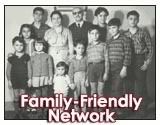Saturday, October 28, 2006
It's Saturday again, time for another poetry showcase! Today, I'll be sharing a nature poem I wrote in December last year. Hope you enjoy!
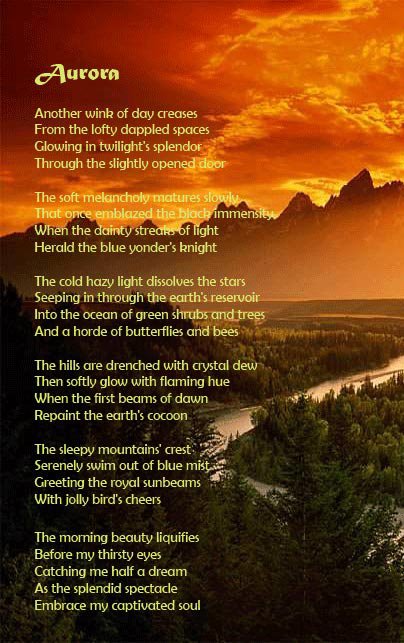
Thursday, October 26, 2006
This 14-year-old makes his guitar sing in his own version of "Canon Rock."
Tuesday, October 24, 2006
Q: How long does it take you to know if there might be chemistry between you? Is there something special you look for?
Summer, 45, Dallas
 My measuring "meter" starts running the minute we meet each other because I check out how he looks at me looking at him. I look for his version of health and fire in his eyes when they look at me. Then, over the course of the date I note his response to my touch. I rub his forearm, his shoulder, hold his hand in my two and rub. If I detect a purr I may even touch his knee lightly, his chin or perhaps even the back of his neck. He'll start to purr if he is in need of warm, caring non-demanding touch, just like the rest of us. That's what I want from him, so that's what I give.
My measuring "meter" starts running the minute we meet each other because I check out how he looks at me looking at him. I look for his version of health and fire in his eyes when they look at me. Then, over the course of the date I note his response to my touch. I rub his forearm, his shoulder, hold his hand in my two and rub. If I detect a purr I may even touch his knee lightly, his chin or perhaps even the back of his neck. He'll start to purr if he is in need of warm, caring non-demanding touch, just like the rest of us. That's what I want from him, so that's what I give. Paul, 33, Los Angeles
 When we meet, it usually takes about one full date/evening. I'm a pretty good judge of character personally. I know what questions to ask without being too pushy. Their answers are pretty much going to reflect on the types of people they truly are. If they say something you think is off the wall, inquire deeper and go for a debate - you may have just misinterpreted them. Having a lot in common usually says a lot. I'm so extremely picky it can be just about anything. Call me superficial - no shame in my game (e.g., You must have nice teeth, good breathe, well manicured hands, just like a clean person. Be a nice person in general, have some goals in life - pretty much the perfect person - LOL. That's why I'm still single -- know anyone?
When we meet, it usually takes about one full date/evening. I'm a pretty good judge of character personally. I know what questions to ask without being too pushy. Their answers are pretty much going to reflect on the types of people they truly are. If they say something you think is off the wall, inquire deeper and go for a debate - you may have just misinterpreted them. Having a lot in common usually says a lot. I'm so extremely picky it can be just about anything. Call me superficial - no shame in my game (e.g., You must have nice teeth, good breathe, well manicured hands, just like a clean person. Be a nice person in general, have some goals in life - pretty much the perfect person - LOL. That's why I'm still single -- know anyone? Erin, 25, Santa Monica, Calif.

When I meet a date for the first time, it doesn't take long for me to know if there is chemistry between us. I can normally tell within the first 15 minutes or so. I look for a sense of humor, a great smile, and eye contact.
Jeremy, 27, Denver

I feel I know within the first five minutes after we meet. Either the person is into the conversation or not. Body language and verbal tone is the best indicator and is an easy thing to look for.
Sylvia, Kingsville, Texas
 I can usually tell if there's chemistry with the eye contact. Throughout the rest of the date, if there's great communication, compatible interests in topics to talk about and some chivalry as well it secures a second date, it's enough to make me want a second date with them.
I can usually tell if there's chemistry with the eye contact. Throughout the rest of the date, if there's great communication, compatible interests in topics to talk about and some chivalry as well it secures a second date, it's enough to make me want a second date with them. Christian, 27, West Hollywood, Calif.
 Obviously, there's the physical component, which hopefully is mostly resolved from being able to see pictures before the date (unless, of course, the picture was 10 years or 50 pounds ago). To me, that aspect is pretty black or white: either I'm attracted to the person or I'm not. The more challenging aspect is personality. I can get a pretty good sense of whether there's chemistry in a first date, but sometimes the person just had a bad night. I look for a sense of humor (crucial), somebody who doesn't take himself too seriously. I think it's fair to give someone a second shot if the first date doesn't pan out; sometimes people just have bad days.
Obviously, there's the physical component, which hopefully is mostly resolved from being able to see pictures before the date (unless, of course, the picture was 10 years or 50 pounds ago). To me, that aspect is pretty black or white: either I'm attracted to the person or I'm not. The more challenging aspect is personality. I can get a pretty good sense of whether there's chemistry in a first date, but sometimes the person just had a bad night. I look for a sense of humor (crucial), somebody who doesn't take himself too seriously. I think it's fair to give someone a second shot if the first date doesn't pan out; sometimes people just have bad days. Ronna, 35, Redmond, Wash.
 Sometimes it is instantaneous. I will usually give 30 minutes to an hour to know. I know within a minute generally. If someone lies about their height or anything I tune them out and think why bother. I look for confidence first! If we've spoken on the phone they should be relaxed when meeting me.
Sometimes it is instantaneous. I will usually give 30 minutes to an hour to know. I know within a minute generally. If someone lies about their height or anything I tune them out and think why bother. I look for confidence first! If we've spoken on the phone they should be relaxed when meeting me. Julie, 40, Los Angeles
 As much as I don't like to admit it, I think the truth of the matter is that I know in the first second I meet someone. I've definitely done my share of "hanging around" to see if the spark will somehow grow, or reveal itself, but in the final analysis - if it isn't there right away, it's never going to happen.
As much as I don't like to admit it, I think the truth of the matter is that I know in the first second I meet someone. I've definitely done my share of "hanging around" to see if the spark will somehow grow, or reveal itself, but in the final analysis - if it isn't there right away, it's never going to happen. Freddie, 56, Phoenix

When I meet a date for the first time, I rely on my intuition about the person, and her conversation. I do not look for something special or chemistry. For myself it is more of a feeling than anything else.
Kathryn, 34, Northville, Mich.

Right away! You can usually tell if you'll be headed out for a second date by that first initial "Hi". I wouldn't say it's a certain look, more like a "connection" (and hopefully you'll both feel it!).
Tim, 41, Springtown, Texas
 Some people say that they know right away and to that some of it may be true. But I have also grown to be attracted over a period of time to some that didn't hit it off right the first time around. I'm not one to give up on the first meet, good or bad, unless things are going very badly.
Some people say that they know right away and to that some of it may be true. But I have also grown to be attracted over a period of time to some that didn't hit it off right the first time around. I'm not one to give up on the first meet, good or bad, unless things are going very badly. Laura, 35, Los Angeles
 I feel that people know if there is chemistry right away. And the older one gets the easier it is to say what you want and not beat around the bush. Two people could be meeting for the first time and there might not be that -- feeling -- and if you are young or inexperienced people tend to drag things out and put up with the torture of not liking the person but having to sit there and endure it. I think by dating often one knows pretty quickly if they like the person as a potential boyfriend/girlfriend or just get that brother/sister vibe. In terms of looking for something special...it all depends on the person and what they want in a partner. Good grooming, sense of humor, intelligence are probably top three on a lot of people's books.
I feel that people know if there is chemistry right away. And the older one gets the easier it is to say what you want and not beat around the bush. Two people could be meeting for the first time and there might not be that -- feeling -- and if you are young or inexperienced people tend to drag things out and put up with the torture of not liking the person but having to sit there and endure it. I think by dating often one knows pretty quickly if they like the person as a potential boyfriend/girlfriend or just get that brother/sister vibe. In terms of looking for something special...it all depends on the person and what they want in a partner. Good grooming, sense of humor, intelligence are probably top three on a lot of people's books. Elaunda, 34, Lithonia, Ga.
 It usually takes about 10 minutes. Basically I look at the way they carry themselves. Are they confident about themselves or are they shy and won't look me in the eyes. I tend to prefer someone who is outgoing and friendly and doesn't have a problem keeping up their end of the conversation.
It usually takes about 10 minutes. Basically I look at the way they carry themselves. Are they confident about themselves or are they shy and won't look me in the eyes. I tend to prefer someone who is outgoing and friendly and doesn't have a problem keeping up their end of the conversation.
Saturday, October 21, 2006
Since I revamped my blog, I've received emails from friends and readers requesting that I also post my poems from my homepage (www.rachelle.co.nr). I've been toying with the idea and I don't see much reason to decline. So, why not? That'd be added exposure for those poems caked in dust for eons!
 So I decided, beginning this week, (even if the muse eludes
So I decided, beginning this week, (even if the muse eludes  ) I'll post one poem from my slush pile starting with the graphic ones on my main site and each week thereafter. To start off, here's On a Moonlit Night, a pensive yet intriguing free verse. Enjoy!
) I'll post one poem from my slush pile starting with the graphic ones on my main site and each week thereafter. To start off, here's On a Moonlit Night, a pensive yet intriguing free verse. Enjoy!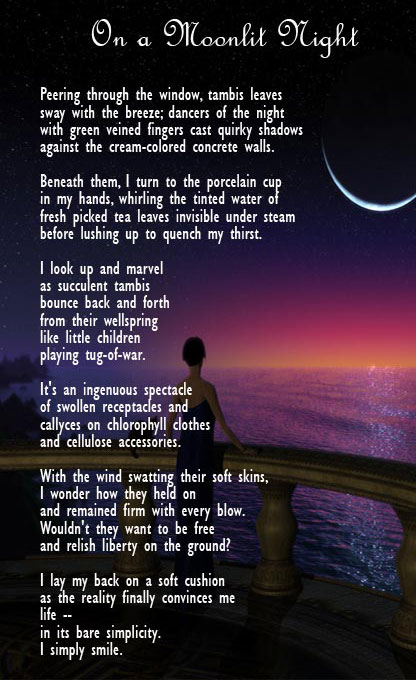
Wednesday, October 18, 2006
The basic list of the Seven Wonders of the World (which we all know too well) was drawn up in 140 BC by a Greek writer and poet Antipator of Sidon.
* The Mausoleum at Halicarnassus
* The Colossus of Rhodes
* The Hanging Gardens of Babylon
* The Lighthouse at Alexandria
* The Statue of Zeus
* The Temple of Artemis
* The Pyramids of Egypt
However, apart from the Pyramids, the seven ancient wonders of the world no longer exist. It is by this reason that Bernard Weber, a Swiss film-maker and explorer is hosting an effort to choose the seven modern wonders by democratic vote. The results of the global campaign will be announced on July 7, 2007, in Lisbon. An original list of nearly 200 sites were nominated by the public (about 20 million votes) and has now been narrowed to 21 by the organizers and experts.
Among 21 locations shortlisted for the worldwide vote, my fave picks are the following...
Angkor (12th century) Cambodia
 Angkor is the most important monument of the south-east Asian Khmer Empire and the world's largest sacred temple. Built during the reign of King Suryavaman, at the beginning of the 12th century, Angkor is noted for its intricate ornamentation and striking beauty. With its water moats, concentric walls and magnificent temple mountain in the center, Angkor Wat symbolizes the Hindu cosmos, with its oceans at the periphery and the Meru mountain at the center of its universe.
Angkor is the most important monument of the south-east Asian Khmer Empire and the world's largest sacred temple. Built during the reign of King Suryavaman, at the beginning of the 12th century, Angkor is noted for its intricate ornamentation and striking beauty. With its water moats, concentric walls and magnificent temple mountain in the center, Angkor Wat symbolizes the Hindu cosmos, with its oceans at the periphery and the Meru mountain at the center of its universe.The Great Wall of China (220 B.C and 1368 - 1644 A.D.) China

The Great Wall of China was built to link existing fortifications into a united defense system and better keep invading Mongol tribes out of China. It is the largest man-made monument ever to have been built and is the only one visible from space. Many thousands of people must have given their lives to build this colossal construction.
The Roman Colosseum (70 - 82 A.D.) Rome, Italy
 This great amphitheater in the centre of Rome was built to give favors to successful legionnaires and to celebrate the glory of the Roman Empire. Its design concept still stands to this very day, and virtually every modern sports stadium some 2,000 years later still bears the irresistible imprint of the Colosseum's original design. Today, through films and history books, we are even more aware of the cruel fights and games that took place in this arena, all for the joy of the spectators.
This great amphitheater in the centre of Rome was built to give favors to successful legionnaires and to celebrate the glory of the Roman Empire. Its design concept still stands to this very day, and virtually every modern sports stadium some 2,000 years later still bears the irresistible imprint of the Colosseum's original design. Today, through films and history books, we are even more aware of the cruel fights and games that took place in this arena, all for the joy of the spectators.Statues of Easter Island (10th - 16th Century) Easter Island, Chile
 Discovered on Easter Sunday, 1722 by Dutch explorer Jakob Roggeveen, this collection of 25 meter-high stone sculptures still puzzles historians and archaeologists as to its origins. It is believed that a society of Polynesian origin settled here in the 4th century and established a unique tradition of monumental sculpture. Between the 10th and 16th centuries, they erected the enormous stone figures, known as the Moai, which have long fascinated the entire world and endowed this island with a mythical atmosphere.
Discovered on Easter Sunday, 1722 by Dutch explorer Jakob Roggeveen, this collection of 25 meter-high stone sculptures still puzzles historians and archaeologists as to its origins. It is believed that a society of Polynesian origin settled here in the 4th century and established a unique tradition of monumental sculpture. Between the 10th and 16th centuries, they erected the enormous stone figures, known as the Moai, which have long fascinated the entire world and endowed this island with a mythical atmosphere.Machu Picchu (1460-1470), Peru
 In the 15th century, the Incan Emperor Pachacutec built a city in the clouds on the mountain known as Machu Picchu ("old mountain"). This extraordinary settlement lies halfway up the Andes Plateau, deep in the Amazon jungle and above the Urubamba River. It was probably abandoned by the Incas because of a smallpox outbreak and, after the Spanish defeated the Incan Empire, the city remained 'lost' for over three centuries. It was rediscovered by Hiram Bingham in 1911.
In the 15th century, the Incan Emperor Pachacutec built a city in the clouds on the mountain known as Machu Picchu ("old mountain"). This extraordinary settlement lies halfway up the Andes Plateau, deep in the Amazon jungle and above the Urubamba River. It was probably abandoned by the Incas because of a smallpox outbreak and, after the Spanish defeated the Incan Empire, the city remained 'lost' for over three centuries. It was rediscovered by Hiram Bingham in 1911.Petra (9 B.C. - 40 A.D.), Jordan
 On the edge of the Arabian Desert, Petra was the glittering capital of the Nabataean empire of King Aretas IV (9 B.C. to 40 A.D.). Masters of water technology, the Nabataeans provided their city with great tunnel constructions and water chambers. A theater, modelled on Greek-Roman prototypes, had space for an audience of 4,000. Today, the Palace Tombs of Petra, with the 42-meter-high Hellenistic temple facade on the El-Deir Monastery, are impressive examples of Middle Eastern culture.
On the edge of the Arabian Desert, Petra was the glittering capital of the Nabataean empire of King Aretas IV (9 B.C. to 40 A.D.). Masters of water technology, the Nabataeans provided their city with great tunnel constructions and water chambers. A theater, modelled on Greek-Roman prototypes, had space for an audience of 4,000. Today, the Palace Tombs of Petra, with the 42-meter-high Hellenistic temple facade on the El-Deir Monastery, are impressive examples of Middle Eastern culture.Timbuktu (12th century) Mali
 In the 12th century, Timbuktu was at the crossroads of the four most important caravan paths supplying the Arab world, which then spanned from the Middle East all the way to Spain. The accumulation of wealth made it one of the wealthiest places on earth at the time. This allowed one of the first universities in the history of humankind to be established - the celebrated Islamic university called the Koranic Sankore, where 20,000 students studied law, medicine, rhetoric, etc. Today, it remains with us as a powerful myth and, in this way, resembles another Ancient Wonder, the Hanging Gardens of Babylon.
In the 12th century, Timbuktu was at the crossroads of the four most important caravan paths supplying the Arab world, which then spanned from the Middle East all the way to Spain. The accumulation of wealth made it one of the wealthiest places on earth at the time. This allowed one of the first universities in the history of humankind to be established - the celebrated Islamic university called the Koranic Sankore, where 20,000 students studied law, medicine, rhetoric, etc. Today, it remains with us as a powerful myth and, in this way, resembles another Ancient Wonder, the Hanging Gardens of Babylon.Christ Redeemer, Sydney Opera, Statue of Liberty, and Eiffel Tower are definitely off my list. While they may be modern and an awe-inspiring sight, but that's just what they are, simply modern buildings with a bit of artistic flair.
Sunday, October 15, 2006
I got this from http://datetosave.com while I was skimming through my RSS feeds. I just thought it might brighten your day so I'm sharing the laughter. Enjoy!
1. If he tells you that you are hot...
Tell him God made you hot.
2. If he wants to hold your hand...
Give him a Bible.
3. If he tries to get closer...
Tell him the Holy Spirit is wooing him.
4. If he asks to pay for dinner...
Remind him that Jesus also paid a debt He did not owe!
5. If he reaches his arm around you...
Tell him that nobody will ever be as close to you as Jesus is.
(or ask him if you instead could "lay hands" on him in prayer)
6. If he tries to kiss you...
Remind him that a kiss killed your Savior.
(and you're not ready to "speak in tongues")
7. If he asks to come inside...
Ask him if he has asked Jesus to come inside his heart.
8. If he tells you he loves you...
Tell him that Jesus loves him.
9. If he gets angry that you won't put out...
Clarify to him that W.W.J.D. does NOT mean "Who would Jesus Do."
10. After you dump him...
Tell him that Jesus Christ will never leave or forsake him.
Friday, October 13, 2006
I've just come across a book which I believe will hold special meaning for single women who have lost hope of finding their mate. The book is "Turn Your Cablight On: Get Your Dream Man in 6 Months or Less" by Nancy Slotnick and it reveals an easier route to finding Mr. Right. The main theme of the book -- and the catchy metaphor -- is that if you want to find love, you've got to turn on your charm and your availability to attract it. Here are a few tips to help you tee off:
- Spend 15 hours a week putting yourself out there. Many people instinctively balk at this number, but if you think about the time you spend pursuing other interests, your search for love should get the same effort. Plus, once you're in a relationship, you'll be spending at least this amount of time together. Go to coffee shops, take a new class, or do some online dating!
- Let him do the chasing. It's controversial and seems anti-feminist, but Nancy believes that it's the men who should be doing the calling and date planning-initially. She's quick to stress that she doesn't believe in playing hard to get or listening to The Rules. She just thinks that men who are truly interested and serious about a woman will make the effort to pursue in the beginning of the relationship. It's a way to separate the wheat from the chaff. So relax and follow his lead initially.
- Don't play hard to get, be hard to get. Nancy says, and I agree, that love comes knocking when you are busy with your own life. You've got to keep your cablight on, but don't wait around or put your life on hold until you have a man. You never know who you might meet simply by living your life.
- Sex doesn't equal a relationship. If you decide to do it, you can't assume he's going to commit. Make your boundaries clear before you get into the bedroom. A long explanation isn't necessary. Just say, "I'm not comfortable having sex unless I'm in an exclusive relationship." That's it. The ball is in his court.
The book's highlight is basically on making dating a priority while not at all taking it seriously. In essence, it all boils down to having fun while living a good life. Now, isn't that what dating is all about?

Wednesday, October 11, 2006
I've always been a sweet tooth for cola. It'd always been my staple.(I called it my daily bread.) The sweet amalgamation of aspartame, phosphoric acid, sodium benzoate and caffeine was just the ultimate thirst-quencher. I never really had a clue where my indulgence with cola would take me until I caught a glimpse of an article that changed my penchant for the beverage. The heading read, "Cola may be Bad for Women."
The article was published in the October issue of the American Journal of Clinical Nutrition and it suggested that cola boosts osteoporosis risk. According to Katherine Tucker, the director of the Epidemiology and Dietary Assessment Program at the Jean Mayer USDA Human Nutrition Research Center on Aging at Tufts University, "cola beverages were associated with lower bone mineral density. Women who drink cola daily had lower bone mineral density than those who drink it only once a week."
Alright, I knew that caffeine had something to do with low memory and slow cognition... but bone density? I was totally mystified so I read on...
In the study, Tucker's team collected data on more than 2,500 participants in the Framingham Osteoporosis Study, averaging just below 60 years of age. The researchers looked at bone mineral density at three different hip sites, as well as the spine. They found that in women, drinking cola was associated with lower bone mineral density at all three hip sites, regardless of age, menopause, total calcium and vitamin D intake, or smoking or drinking alcohol. Women reported drinking an average of five carbonated drinks a week, four of which were cola. They said that bone density among women who drank cola daily was almost 4 percent less, compared with women who didn't drink cola.
The reason for the density change, according to the researchers, is attributed to caffeine interfering with calcium absorption, thus resulting in less bone formation and phosphoric acid (in cola) causing leeching of calcium from bones to help neutralize the acid.
Who would have known something so sweet and delightful was actually a silent killer? Although it breaks my appetite to let it go, I think I'd take my chances. I'd just have to slowly kill the addiction before it breaks me (literally)...
Monday, October 09, 2006
I'm going PINK! Nah..not really.. I just ripped the greens and blues for a lighter and cooler hue (indian red) for October. I heard that this month is the Breast Cancer Awareness Month and the "Pink for October" (launched by a certain Matthew Oliphant - Pinkforoctober.org) was a way to highlight breast cancer and spread awareness on the signs and symptoms of the disease. So, why not? There'd be thousands of savvy net surfers "pinkifying" their sites, so why not picket with the activists, I mean advocates.
However, on second thoughts... my homepage's dyed to pink already (www.rachelle.co.nr) No way! I'm no pink maniac...so I dropped the idea before my fickle brain could pick on it.
 I settled with a lighter shade to at least show my advocacy.
I settled with a lighter shade to at least show my advocacy.And the day's toil with stylesheets and markup languages began...I had to redo my entire layout to lessen the kid/fun-design oriented theme and added a few touches (pictures galore!). After several hours of whiplashing and hair-pulling I've got a new design up, ready for the taking! Wohooo!

So, what d'yah think?
On a serious note, here are some resources:
- BreastCancer.org
- Susan G. Komen Breast Cancer Foundation
- The Breast Cancer Site
- Breast Cancer Home Page - National Cancer Institute
- Make a Donation
Sunday, October 01, 2006

It is October 1st, time for the FIRST Day Blog Tour! (Join our alliance! Click the button!) The FIRST day of every month we will feature an author and their latest book's FIRST chapter!
GINGER GARRETT
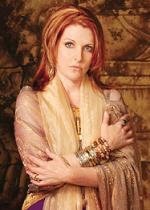
Guess what? The publicists for Ginger have agreed to a book contest for each FIRST member's blog post on
Dark Hour It is up to the member on how they judge which commenter wins the free book...so, comment and you might become a winner!
ABOUT THE AUTHOR:
Ginger Garrett is an acclaimed novelist and expert in ancient women's history.
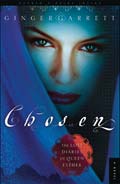 Her first novel, Chosen, was recognized as one of the best five novels of the year by the Christian publishing industry. Ginger enjoys a diverse reader base and creates conversation between cultures.
Her first novel, Chosen, was recognized as one of the best five novels of the year by the Christian publishing industry. Ginger enjoys a diverse reader base and creates conversation between cultures. In addition to her 2006 and 2007 novels about the most evil women in biblical history, she will release Beauty Secrets of the Bible (published by Thomas Nelson) in Summer 2007.
Ginger Garrett's Dark Hour delves into the biblical account of Jezebel's daughter and her attempt to end the line of David.
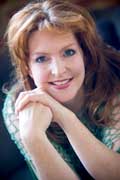
And now, a special Q&A with Ginger Garrett:
1.) First, tell us a bit about Dark Hour.
I was praying about what book to write after Chosen, and accidentally left my open Bible on the kitchen table. (A dangerous thing, since in my house, small children and large dogs routinely scavenge with dirty hands and noses for snacks!) As I walked past it, I saw a caption about someone named Athaliah and a mass murder. I stopped cold. I knew it was my story.
Athaliah was the daughter of Jezebel--a real woman in history--who tried to destroy all the descendents of King David in a massacre. God made a promise that a descendent of King David would always sit on the throne, and one day a Messiah would come from this line. If Athaliah succeeded, she would break the promise between God and the people, and destroy all hope for a Messiah.
One woman, her step-daughter, Jehoshebeth, defied her. She stole a baby during the massacre and hid him. Between them, the two women literally fought for the fate of the world.
2.) What drew you to write biblical fiction?
The similarities between the lives of ancient women and our lives. We get distracted by their "packaging," the way they dressed and lived, but at heart, our stories are parallel.
3.) How much time is spent researching the novel versus writing the novel?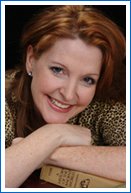
Equal amounts, and I don't stop researching while I write. I have a historical expert, probably the best in the world in his field, review the manuscript and point out errors. The tough part is deciding when to ignore his advice. He pointed out that most everyone rode donkeys if they weren't in the military, but a key scene in the novel involves riding a horse to the rescue. It would have been anti-climatic to charge in on a donkey! :) So I ignored his advice on that one.
4.) Dark Hour takes its reader deep into the heart of palace intrigue and betrayals. Were parts of this book difficult to write?
I left out much of the darkest material I uncovered in research. It was important to show how violent and treacherous these times and this woman (Athaliah) could be, but I tried to be cautious about how to do it. The story was so powerful and hopeful--how one woman's courage in the face of evil saved the world--but the evil was depressing. I tried to move quickly past it. I wanted balance. Our heroine suffers and some wounds are not completely healed in her lifetime. That's true for us, too.
5.) What would modern readers find surprising about ancient women?
They had a powerful sense of the community of women. They also wore make-up: blush, glitter eyeshadow, lipstick, powder, and perfume! They drank beer with straws, and enjoyed "Fritos": ground grains, fried and salted. Many of our foods are the same today, but they loved to serve pate made from dried locusts, finely ground. Ugh!
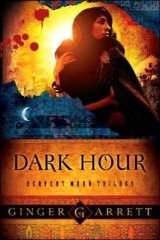 Without further ado...here is the FIRST chapter of Dark Hour by Ginger Garrett. Judge for yourself if you'd like to read more!
Without further ado...here is the FIRST chapter of Dark Hour by Ginger Garrett. Judge for yourself if you'd like to read more!(There is a prologue before chapter one regarding the birth of Jehoshebeth... Athaliah is not Jehoshebeth's biological mother.)
c h a p t e r O n e
Fifteen Years Later
HER BARU, the priest of divination, opened the goatskin bag and spread the wet liver along the floor, leaving a path of blood as he worked. Retrieving a wooden board and pegs from his other satchel, the satchel that held the knives and charms, he placed pegs in the board according to where the liver was marked by fat and disease. He turned the black liver over, revealing a ragged abscess.
Athaliah covered her mouth and nose with her hands to ward off the smell but would not turn way.
“Worms,” her sorcerer said, not looking up. He placed more pegs in the board before he stopped, and his breath caught.
A freezing wind touched them, though they were in the heart of the palace in the heat of the afternoon. Athaliah cursed this cold thing that had found her again and watched the sorcerer search for the source of the chill before he returned to the divination. There was no source of wind here; in her chamber there was a bed, the table where her servants applied her cosmetics from ornate and lovely jars shaped like animals, a limestone toilet, and in the farthest corner so that no one at the chamber door would see it, her shrine. Statues of Baal, the storm god, and the great goddess Asherah, who called all life into being, stood among the panting lions carved from ivory and the oil lamps that burned at all hours. Here she placed her offerings of incense and oil, and here she whispered to the icy thing as it worshiped alongside her.
The baru watched as the flames in the shrine swayed, the chill moving among the gods. The flames stayed at an angle until one began to burn the face of Asherah. Her painted face began to melt, first her eyes running black and then her mouth flowing red. He gasped and stood.
“I must return to the city.”
Athaliah stood, blocking him from his satchel.
“What does the liver say?”
“It is not good that I have come. We will work another day.”
She did not move. He glanced at the door. Guards with sharp swords were posted outside.
“A dead king still rules here. You set yourself against him
and are damned.”
Athaliah sighed. “You speak of David.”
The baru nodded and bent closer so no other thing would hear his whisper. “There is a prophecy about him, that one from the house of David will always reign in Judah. His light will never die.”
“I fear no man, dead or living.”
The baru continued to whisper, fear pushing into his eyes, making them wide. “It is not the man you must fear. It is his God.”
Athaliah bit her lip and considered his words. She wished he didn’t tremble. It was such a burden to comfort a man.
“Yes, this God. It is this God who troubles us. Perhaps I can make an offering to Him. You must instruct me. Stay, my friend, stay.” She patted him on the arm, detesting his clammy flesh. “I have dreamed,” she confessed. “I have a message from this God, and I must know how to answer Him.”
The baru took a step back, shaking his head. “What is this dream?”
“A man,” Athaliah said.
“Tell me.”
“At night, when I sleep and the moon blankets my chamber, I see a man. He is not as we are: he is coarse and wild. He wears skins hewn from savage beasts, run round his waist with careless thought, and in his mind he is always running, ax in hand, running. I feel his thoughts, his mind churning with unrest, and he knows mine completely. I hear a burning whisper from heaven and shut up my ears, but he turns to the sound. A great hand touches him, sealing him for what lies ahead, and speaks a name I cannot hear, a calling to one yet to be. I try to strike this man, but all goes red, blankets of red washing down.”
She licked her lips and waited, breathing hard. The baru nodded.
“You see the prophet of Yahweh, Elijah, who plagues your mother.”
The baru began to reach for his goatskin sack. He picked up the liver and put it in the sack, keeping an eye on the door as he wiped his bloody hand on his robes. She knew he was measuring his steps in his mind, thinking only of freedom from here, and from her.
Athaliah grabbed his arm. “I let those who worship Yahweh
live in peace. They mean nothing to me; what is one God in a
land of so many? Why would this God send a man to make war
on my mother and then claim me also?”
The baru narrowed his eyes. “This God is not like the others.”
“How can we be free of Him?”
The baru thought for a moment then reached into his satchel. He pulled out a handful of teeth and tossed them on the ground at her feet. She did not move.
He squatted and read them, probing them with a shaking finger. She watched as the hair along his neck rose, and goose bumps popped all along his skin. The cold thing had wrapped itself tightly around him. She could see his breath.
“There is a child,” he said. “The eye of Yahweh is upon this child, always. I must counsel you to find this child and kill it, for when it is gone, Yahweh would trouble you no more.”
Athaliah murmured and ran her teeth over her lips, biting and dragging the skin as her thoughts worked back in time. “It is my daughter you speak of. Only a girl. But even so, I cannot kill her yet. I would lose my rights as the most favored wife. I will not risk my crown for so small a prize. No, I will find another way to get rid of her, and I will deal with this threat from Yahweh as I must.”
Athaliah walked to her shrine and cleaned the face of Asherah. She could hear the baru scooping the teeth back into the bag. She turned with a sly smile, pleased that her mind worked so quickly even with the cold thing so near.
“My mother has already angered this God. We will let her have our problem. She has a talent for these things.”
He had finished putting everything back into his two sacks and edged toward the door. She wondered if he would return. He was the best she had at divining dreams and saw in the liver so many answers. She sighed and tried to think of a word to reassure him.
“A farmer may own the field,” she began, “but much work is done before a harvest is even planted. Stones are removed, weeds are torn free. We must break loose the soil and uproot our enemies so the field will be ready. On that day I will sow richly.”
He managed a weak smile.
“Let your appetite grow, my friend,” she coaxed. “The harvest is coming.”
He fled so quickly she knew her words had been wasted, as all words were on frightened men. He would never return.
He dined in a dim, private room with his advisers. The room was adjacent to the throne room, where he would one day rule, and was bare, save for an oil lamp on a low table. Cedar beams topped the limestone walls, giving the palace a sweet, smoky scent under the afternoon sun. The men sat around the table, scattered with maps, sharing a lunch of grapes, bread, wine, and cheese. Normally they would eat more, and in the dining hall, but the kitchen servants were busy preparing for the great send-off feast and it was easier to be served here.
Tomorrow, his father, King Jehoshaphat, would lead Judah’s army north toward Israel and King Ahab. Together, the two kingdoms would fight their inconstant friend Ben-Hadad to end his trade monopolies. Ben-Hadad fought alongside them against the cruel Assyrians but turned often and claimed the richest of trade cities for himself.
“There are implications, my prince,” Ethan said. Ethan was the tallest, and his skin turned red when he was angry, which was often. His temper had plagued him since he and the prince were boys, but now Jehoram no longer found pleasure in goading his friend. “If the kings succeed at Ramoth-Gilead against Ben-Hadad,” Ethan continued, “and the proposed alliance is
accepted, your father will have obligations both to the north and south. In this way, Ahab’s kingdom will be strengthened by this victory, and your own kingdom will be compromised. Judah may weaken and fall at last to a king of Israel.”
“I have married the daughter of Ahab,” Jehoram replied. “I have given their daughter an heir and promised her the crown. I have curried the favor of the north well enough. They will not turn on me, for their own daughter is at my side.” He tried to entertain himself with the food and wine while his advisers prattled on. He wondered what would be served at the feast tonight. If the servants’ exhausted expressions were any indication, the spread would be remarkable.
“That is true, my friend,” Ethan said. “But you are wrong to think this is Ahab’s war. It is a woman who is shaping this new world. Think on this: What does the powerful Jezebel desire more than to bring glory to her own name? She wants the north and south reunited so that she may one day rule them both, a queen equal in power to Solomon.”
Ethan smirked as he continued. “Everyone knows Ahab wears the crown but Jezebel rules. With Ahab and Jehoshaphat together in battle, their voices silenced for a time, Jezebel will be listening for yours. Let her know a lion roars in Judah. We will never be ruled by a woman, especially one who hides behind her husband’s crown.”
Jehoram listened, running his tongue across his lips, catching a spot of wine resting just above his lip. Ethan was his truest friend, if a man about to wear the crown had one, but he was always ready for a fight. Jehoram preferred to suffer a blow and stay with his women and wine. He sighed. “Ethan, you look into darkness and see monsters, but I see only shadows. It has always been this way.”
Ethan frowned. “We are no longer children hunting with our fathers at night. Listen to me, for I am the voice of God in your ear.”
Jehoram turned his face away and crossed his arms. Then he sighed and reached for a bowl of grapes and began to eat. He did not like an empty stomach.
Another adviser bit into some cheese and leaned in. “Mighty Ethan is right. Jezebel wants to see you on the throne because of your union with her daughter Athaliah, but she is no ally. Listen to what I tell you: Something evil here stirs the water and watches.”
“These voices of doom!” Jehoram yelled, slapping his bowl down on the table so that it spilled. “These voices and whispers, will they not cease?” He gripped his head and glared at the men. Each had but one wife and thought to advise him on his many? “You warn me against women, even my own wife, but they are women and nothing more!”
Ethan scooted closer to him. “Do not play the fool. Athaliah practices her strange magic and you slip under her spell little by little. There is still time to save yourself, and the kingdom, if you are indeed a man and king.”
Jehoram rose and adjusted his robe around his shoulders, staring down at Ethan.
“Do even my friends turn against me now?” he asked.
“I have always been like a brother to you. I desire nothing but your good,” Ethan said, rising. Jehoram held his temper and the two men glared at each other, breathing hard.
The adviser Ornat spoke. “May I address the future king of Judah?”
Jehoram nodded and sat, returning to his grapes. He glanced at Ethan and shook his head.
Ornat was new to his inner circle, an adviser Athaliah had recommended for his influence among the people who did not worship the God of Judah. She promised his voice would balance the harsh messages the others always gave. He had long, straight gray hair that always hung as if he had just come in from the rain. A magnificent bump crowned his nose, but it was the only remarkable feature about the man, a man who looked as if he were melting before their eyes.
“Good Jehoram,” Ornat began, “the king knows you are a son who is not like the father. King Jehoshaphat has conspired with your brothers to ensure you never take the throne. They plot behind closed doors, taking their meals without you. I have heard the plans from my spies among the servants.”
Jehoram felt his stomach churn at the accusation. He would not allow such ridiculous talk and raised his hand to dismiss the man at once.
The arrival of Athaliah interrupted them, and all bowed as she entered.
“Jehoram, I seek your face with a burden on my heart. Hear me and help me, my lord and husband,” she said.
Jehoram looked at her a moment, his eyes having trouble adjusting to the light that streamed in when the door had opened. She stirred something in him, as she had from her first night in the palace, rain-soaked and announced by thunder, her sheer robes clinging to her tiny frame. She came bearing boxes of shrines and gods, like the dolls of a child, and she clung to them even in their bedchamber. She was the only wife who did not submit to his will, and he had found her exotic. Now she had grown, but his exotic pet was still wild, shaking off the customs and manners he tried to teach her. He knew she hungered, but not for him. His face burned with shame.
“Speak, Athaliah,” he said.
“Your daughter has grown quite pale of late. I have seen this sickness before.”
Jehoram sat up straight. Sickness in the palace would spread
rapidly, a threat as swift and fierce as any Assyrian.
“What sickness?” he demanded.
Athaliah smiled at him, then at the men reclining.
“Of course you do not understand,” she said. “You are men. You have tended your kingdom well but neglected to see that your daughter has come of age.”
Jehoram exhaled and sat back, an indulgent smile on his lips.
“And what remedy does this sickness crave?” he asked.
Athaliah bowed before Jehoram. “She must marry, my lord.”
Jehoram waved his hand, a broad gesture. Here he could be master.
“I command, then, that she be married. If there is a commander well thought of, it would be an honor to give a daughter in marriage just before a battle.”
Athaliah nodded, just once. He felt his victory slipping away.
“I have sent word to the north,” Athaliah said, “to my mother’s house, that a nobleman from my own home who serves in the ivory palace of my mother be given her. King Ahab has sent you his favorite daughter.” She smiled. “Now let us send ours to him. It will be good for Jehoshebeth to hold your name ever before my father, Ahab. And Jezebel would relish a granddaughter so near.”
Jehoram stopped and frowned. “It is Jehoshebeth you speak of? She is a special child to me. I would not have her sent north.”
“But you have given the order that she be married. There is no one else worthy of her,” Athaliah said.
Jehoram rubbed his chin and pretended to study a map. Finally, he shook his head. “I must think on this.”
Athaliah bowed low, her eyes closed. “May the God you serve bless all your decisions, good Jehoram,” she said. She straightened and looked at the advisers. Jehoram could not bear to see their eyes upon his bride, the only territory he owned and could not rule. He detected secrets moving between her and Ornat like a sudden spring bubbling up from a dark source. Only a few found it distasteful and turned away. Ethan was the first to scowl and return his glance to the prince.
“I will see you all at the feast tonight,” Athaliah said as she left.
She wagged a finger at Ornat. “Take care of my good husband.”
Jehoram slouched in his seat and returned to his grapes.
Oftentimes when a relationship ends there are things left unsaid and questions left unanswered. Through the use of this technique you can resolve these issues and allow yourself to move on and let go of the past. This technique can also be used with those that are now deceased.
Sit yourself in a quiet space where you will not be disturbed. Ideally have an empty chair or seat opposite you. Close your eyes for a moment, and take a few deep breaths and allow yourself to relax and let go.
When you open your eyes imagine that you can see the person with whom things are left unsaid sitting opposite you. All you need to do is to pretend they are there, so if you think you are having problems visualising just pretend.
Say to the person whatever is on your mind, whatever you want to release. If there is a situation that you want to resolve, for example the break down of a relationship then talk about that.
When you have finished you may want a response from them. If so then go and sit in the other chair and pretend you are them answering back. Keep your mind focused on what was said when you do and allow the answer to flow. Remember that if you consciously say what you want to hear rather than what you really hear you are only cheating yourself, no one else.
When they have finished speaking, sit back in your original chair.
Keep up the conversation, moving from chair to chair assuming the other person's persona when in their chair until the conversation comes to an end. Then return to your original chair and thank them for their time before going about your business.
This technique is incredible valuable for letting go of pain, guilt and hurt from any sort of relationship, not just romantic relationships. Often when performing this technique you will be surprised by the answers that you receive from the other person.





































